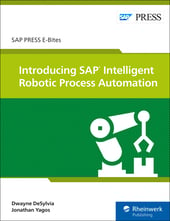Robotic process automation (RPA) is a technology that allows one to automate repetitive, rules-based business processes.
Unlike traditional automation, where steps need to be hardcoded into a system, RPA utilizes machine learning and artificial intelligence to see how to perform tasks by watching users walk through processes.
How Does This Work?
Think of it like recording a macro—except that, once recorded, an RPA bot can act autonomously to execute a task, can be used for complex tasks, can handle exceptions within tasks (such as sending one type of contract to Client A and another type to Client B), and can accumulate knowledge to respond to changing conditions (like UI changes).
For a more accessible example, consider predictive text features in email and text message applications. As you type emails, texts, etc., the app remembers certain syntax and words you use and then automatically makes suggestions based on these when typing in the future.
All of this provides the user with time savings that allows them to do other things, an example of a “work smarter, not harder” strategy.
How Does SAP Utilize RPA?
In fall 2018, SAP introduced SAP Intelligent Robotic Process Automation (SAP Intelligent RPA, or sometimes SAP IRPA) at TechEd Las Vegas and released it to customers in early 2019. This tool allows enterprises to streamline processes in areas such as supply chain, data management, and sales order management.
With SAP Intelligent RPA, companies can automate these tasks and find cost efficiency improvements, process execution time reduction, and an ROI of high double-digits or higher. These financial, operational, and organizational impacts all make a company stronger.
The SAP Intelligent RPA Book
Interested in learning more about what SAP Intelligent RPA can do for you? Introducing SAP Intelligent Robotic Process Automation is our beginner’s guide to this great tool. Dive deeper into RPA and its history, what RPA means when compared to IRPA, and more.
In this E-Bite, learn how you can capture and orchestrate applications, execute new projects, monitor existing projects, and utilize the SAP Intelligent RPA desktop agent and factory. Other highlights include machine learning and AI, local testing, exporting packages, the Cloud Factory, and an additional resources section to continue learning.
Who Is This E-Bite For?
Those who are looking into automating their activities will like the content in this E-Bite. This includes automation managers, RPA developers and other specialists, system and software architects, and technical consultants.
Additionally, those who are exploring SAP and its BI solutions such as SAP Predictive Analytics and the SAP Leonardo toolset will enjoy learning about SAP Intelligent RPA. If you want to save money via automation and free up talent to do more tasks, exploring SAP Intelligent RPA is the first step to take.
About the Authors
Dwayne DeSylvia is a principal solution engineer at SAP with a passion for streamlining and accelerating the adoption of innovation by enterprises.
Jon Yagos is a senior technology professional at SAP and is a data geek at heart. He is passionate about creatively using data to promote change within organizations and using new applications to present that data to every facet of the business.
How to Purchase
If you’re interested in purchasing Introducing SAP Intelligent Robotic Process Automation, you can do so by following this link.
Learn even more about intelligent technology like SAP Intelligent RPA from our overview here.
If you want to continue learning about business intelligence with SAP, or you want information on other upcoming SAP BI books or special offers, make sure to sign up for our business intelligence topic newsletter or our weekly blog recap.



Comments